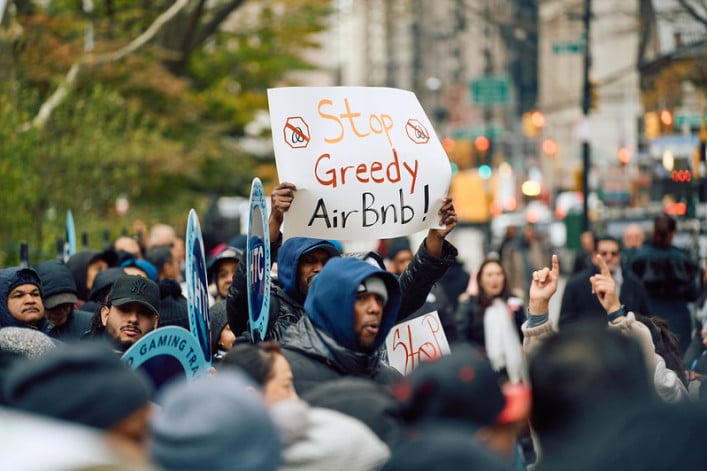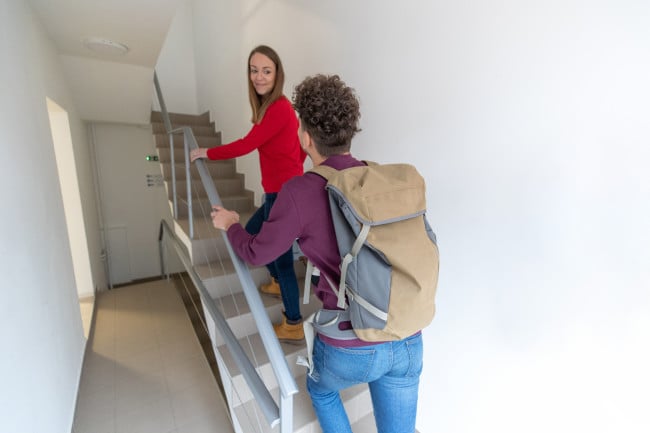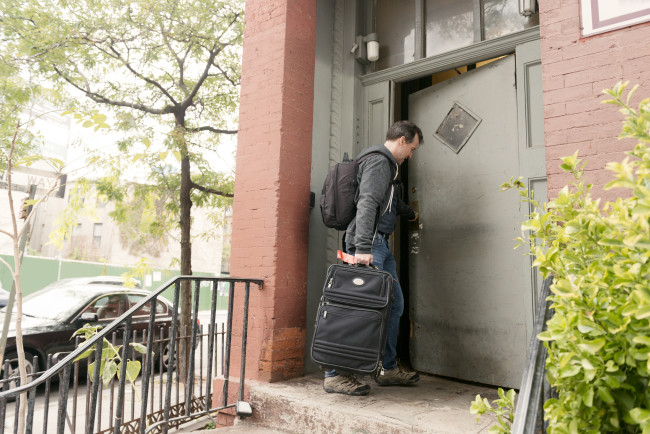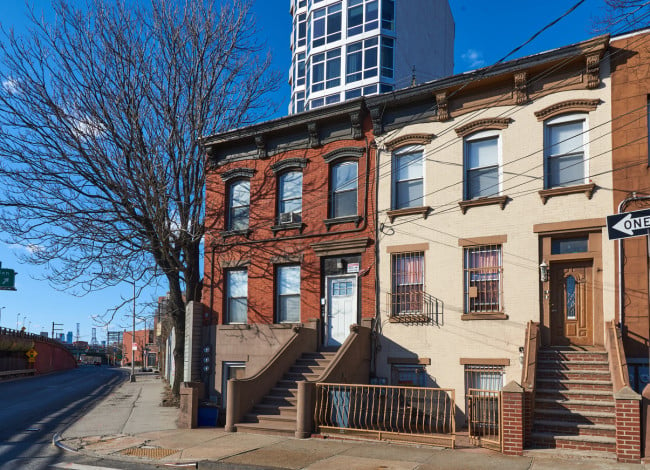Should NYC relax rules for short-term stays at private homes?
- City Council committee holds hearing on two short-term rental proposals
- Both bills would make exceptions for owners of one- and two-family houses

Protestors outside City Hall yesterday prior to a committee hearing on proposed changes to NYC's short-term rental rules.
Cristobal Vivar/NYC Council Media Unit
The City Council’s Committee on Housing and Buildings held a hearing yesterday on two bills that would chip away at New York City’s strict rules for short-term rentals by making exceptions for owners of one- and two-family houses.
One- and two-family homes make up over 28 percent of the city’s housing stock and just over 14 percent or 320,000 units of its rental stock, according to the Mayor’s Office of Special Enforcement (OSE).
Sponsored by two Brooklyn Council Members, Mercedes Narcisse and Farah N. Louis, the bills are intended to bring financial relief to minority owners who are struggling to stay in their homes and rely on home sharing to help afford their mortgages and household expenses.
Still, Council Member and Chair of the Committee Pierina Ana Sanchez opened the hearing by saying she had serious concerns about creating carveouts for one type of housing that would ultimately make short-term rental rules hard to enforce.
“What looks like small language changes could fundamentally alter how we use our homes,” Sanchez said.
In addition, she said she was bothered by language that treated one group of renters as more desirable than others. “We must be careful not to fall into narratives [that] treat renters as unreliable, as opposed to tourists,” she said.
‘People are losing their homes’
In dramatic testimony, Council Member Narcisse asked the chamber to address “the elephant in the room: Black and brown people are losing their homes over…expenses as little as $5,000,” she said.
Her legislation, Int. 948, would expand the number of guests from two to four, allow hosts to put locks on internal doors, and permit owners to host without being present for short stays.
“For so many New Yorkers, especially in my communities, this issue is personal. It is about whether a long-time homeowner can afford to stay in the home they worked so long to afford. They need this lifeline,” she said.
The other piece of legislation Int. 1107, is sponsored by Council Member Louis and changes the common household requirement so hosts would not need to provide access to private spaces.
She explained her legislation works in tandem with Int. 948 when the owner is not physically present and reiterated the goal is to halt a crisis for minority owners.
“We must preserve Black homeownership in the city. This is urgent, necessary legislation to keep Black owners in their home,” she said, pointing out that Canarsie and Flatbush, which have a large population of Black owners, have seen a high number of foreclosures.
NYC foreclosures rose 16 percent in the third quarter of this year to 412 first-time residential foreclosure filings, according to an October report from PropertyShark.
‘Open the floodgates’
In his remarks at the hearing, Christian Klossner, executive director of OSE, said that both bills “risk undoing the significant gains made under Local Law 18.”
This local law created a registry system to enforce the city’s long-time ban on short-term rentals under 30 days and requires short-term listing sites to verify registration status. Local Law 18 also established the Prohibited Buildings List, which now totals over 21,000.
“While both bills suggest they apply only to one- and two-family homes, each changes the definition of ‘family’ in city laws. Changing the definition of ‘family’ would apply to every home in the city, not just one- and two-family homes,” Klossner said.
He argued that Int. 948 would “open the floodgates to unhosted short-term rentals” and also incentivize investors to shop for large properties to take advantage of the higher number of short-term renters.
The bills also conflict with the city’s safety requirements, Klossner said. One- and two-family houses are exempt from safety precautions like sprinklers and fire alarms hardwired to the fire department. The bills would eliminate the required presence of a permanent occupant who knows the layout and locations of exits, and allow more locked interior doors, creating risks for both occupants and firefighters, he said.
Testimony for and against
Several hundred New Yorkers signed up to give testimony on the changes to the short-term rental laws but had to wait several hours while the committee focused on other business.
Some speakers addressed concerns about undoing the effectiveness of Local Law 18. Darius Khalil Gordon, executive director of the Met Council on Housing, spoke against the bills’ ability to take rental units off the market. “Every housing unit matters,” he said.
But several supporters of the legislation pointed out that renting out their owner-occupied homes would not impact levels of rental units.
Gia Sharp, co-founder of Restore Homeowner Autonomy & Rights, a coalition representing more than 700 homeowner households, decried the “false narrative that private-owned homes are part of housing stock.”
One speaker reminded the committee that the 2026 FIFA World Cup will be held at MetLife Stadium in New Jersey. Without changes to NYC’s short-term rental rules, the city is essentially telling “five million visitors to go stay in New Jersey,” she said.
Laurie, who has been a homeowner for 33 years and hosts short-term guests to make ends meet, was blunt. “Why is it anybody’s business who I share my home with?” she asked.
Just 3,000 active registrations
In September, OSE said that the vast majority of NYC’s illegal short-term rental activity has been eradicated, two years after major booking companies started complying with Local Law 18.
Compared to an estimated 60,000 illegal listings on major booking platforms in 2018, and over 38,000 active listings at the beginning of 2023 on a single site, OSE said there are now just 3,000 active short-term rental registrations in the city.
In its annual report on Local Law18, OSE said it approved 40 percent of registration applications received in the last year and that average review times were less than a week. The report also noted that over 4,300 applications were denied for not complying with the city’s short-term rental laws.
You Might Also Like





























